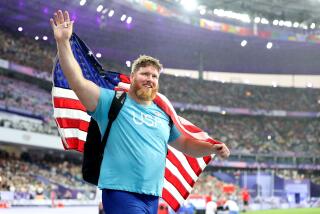TRACK AND FIELD / GRAND PRIX FINAL : Joyner-Kersee Scores One for Equal Pay
- Share via
PARIS — Jackie Joyner-Kersee and Heike Drechsler are close friends, which is remarkable considering that they have regularly competed against each other in the long jump for eight years and that one grew up in East St. Louis and the other in East Germany.
But there is friendship, and there is business, and while Joyner-Kersee is too easy-going to publicly complain, she did not object when her coach/manager/husband, Bob Kersee, did because Drechsler was receiving more lucrative appearance fees on this summer’s European track and field circuit.
“It upset me more, of course, but, really, this is one time when we agreed,” said Kersee, who withdrew Joyner-Kersee from two meets before promoters realized he was serious and agreed that she and Drechsler should receive equal pay.
Then, it was up to Joyner-Kersee to prove she deserved it.
If she had not already done that, she certainly did Saturday in the Mobil Grand Prix Final. In her fifth victory in six meetings against Drechsler this season, Joyner-Kersee won with a best of 23 feet 8 inches. That was a foot and a quarter better than the 22-5 jumped by Drechsler, who finished third. Ukraine’s Inessa Kravets was second at 22-10 3/4.
Joyner-Kersee earned $30,000 for winning the 15-meet Grand Prix women’s long-jump championship and an additional $100,000 for finishing first among all female track and field athletes in the overall standings.
Although it might have seemed like an unusual time to complain about money, Kersee realized that there might never be a better one after surveying the near-capacity crowd in the newly refurbished, 20,000-seat Charlety Stadium.
Coinciding with the close of the Olympic Centennial Congress in Paris, the meet attracted the most influential members of the International Olympic Committee, including President Juan Antonio Samaranch, and the International Amateur Athletic Federation, which governs track and field. With all those policy-makers within earshot, Kersee began his newest crusade.
“My goal this year was to get Jackie up there with Heike in pay,” Kersee said. “Jackie is the world’s greatest woman athlete, and if she hasn’t ranked with Heike in the long jump the last few years, it’s because Jackie has been concentrating on the heptathlon.
“But now that’s settled, the next step is to get Jackie, Heike and the other top women up there with the men sprinters, pole vaulters and distance runners. Some of them make about $25,000 or $30,000 a meet. The best women average about half that. They have to set a world record and collect a bonus just to get what a man gets for running a normal race. That’s not fair. The women are just as good for the sport as the men.”
Based on Saturday’s activities, score one for Kersee.
The two best performances were by women. France’s Marie-Jose Perec, who lives and trains in Westwood, returned to Paris and ran the fastest time of the year in the 400 meters, 49.77. Jamaica’s Merlene Ottey ran the second-fastest time of the year in the 100 meters with a personal best of 10.78. Runner-up Gwen Torrence of the United States also ran a personal best, 10.82.
The men, for the most part, appeared burned out by the long season, although there were some interesting results.
Unsure about whether to compete after awaking Saturday with bronchitis, Algeria’s Noureddine Morceli decided that he should at least make the effort considering that he entered the meet with the lead in the 1,500 meters and the overall standings. Fortunately for him, his competitors did not push the pace, and Morceli won in 3:40.89, earning him, like Joyner-Kersee, $130,000.
A photo was required after the 100 meters to determine that the United States’ Dennis Mitchell beat Great Britain’s Linford Christie, the Olympic and world champion. Believing that he had won, Christie took a victory lap. “How embarrassing,” he said later, upon learning that he had been recorded in 10.13 to Mitchell’s 10.12.
Ukraine’s Sergei Bubka won the pole vault at 19-4 1/4, but just as he was about to make a world-record attempt at 20-2 1/4, a windy afternoon turned rainy. He packed up his poles and said au revoir .
More to Read
Go beyond the scoreboard
Get the latest on L.A.'s teams in the daily Sports Report newsletter.
You may occasionally receive promotional content from the Los Angeles Times.







